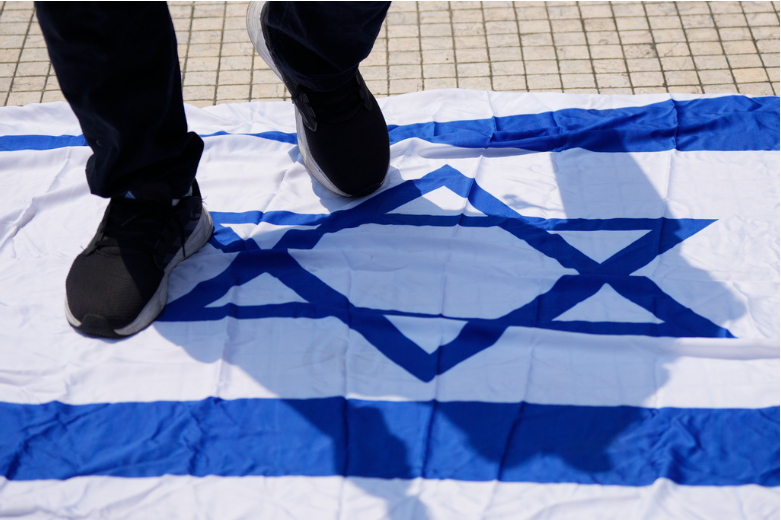Malaysia and Indonesia Express Strong Support for Palestine
A man steps on an Israeli flag during a protest outside the national mosque after the Friday prayer in Kuala Lumpur, Malaysia. Photo: AP Photo/Vincent Thian
In the midst of the worldwide polarization over the Israel-Palestine conflict, Southeast Asia has not been immune to its impact. Malaysia and Indonesia, two predominantly Muslim nations, have voiced strong support of the Palestinian cause. In contrast, several other countries in the region have maintained relatively vague or pro-Israel stances on the issue.
In Malaysia, Prime Minister Anwar Ibrahim has refrained from condemning Hamas, despite pressure from Western governments that have repeatedly urged Malaysia to denounce the militant group. Instead, he has expressed Malaysia’s unwavering support for the Palestinian people. He has engaged in a conversation with the Hamas Head of Political Bureau, Ismail Haniyeh, and continues to maintain relations with the group while criticizing Western support for Israel.
In a statement posted to X, formerly known as Twitter, Ibrahim called for a ceasefire while promising humanitarian aid. “Given the dire situation in Gaza, I strongly advocate for the immediate cessation of bombardment and the establishment of a humanitarian corridor in Rafah,” he said.
Malaysia does not have diplomatic ties with Israel but has historically maintained relations with the political forces in Palestine. The conflict in Gaza has united Malaysian leaders across the political spectrum to express support for Palestine. Leaders of the Chinese-minority-linked Democratic Action Party (DAP) were even photographed with the fundamentalist Pan-Malaysian Islamic Party (PAS), together with the Palestinian Authority’s ambassador to Malaysia.
Along with this official show of support from government officials, about 15,000 Malaysians took to the streets in Kuala Lumpur this past Friday to express their support for Palestine and condemn Israeli air attacks. Former prime ministers Muhyiddin Yassin and Mahathir Mohamad were present, as well as leaders of PAS, DAP, the United Malays National Organization, and members of the current prime minister’s cabinet.
Part of the large show of public support in Kuala Lumpur was the gathering at the National Mosque, where a crowd of around 1,000 gathered, many waving Palestinian flags in solidarity. It was only one of many rallies that occurred around Malaysia last Friday, and religious leaders conducted special prayers for Palestine.
Muslim protesters burn U.S. and Israel national flags during a rally against the Israeli airstrikes in Gaza, outside the U.S. Embassy in Jakarta, Indonesia on Wednesday, Oct. 11, 2023. Photo: AP Photo/Tatan Syuflana
Similar protests have occurred in Indonesia, which has had long-standing support for Palestine and is currently calling for a humanitarian ceasefire. In a rally that occurred at the same time as the protests in Malaysia, thousands of Indonesians gathered in Jakarta to call for an end to the violence. Several Indonesian labor groups also protested outside of the US Embassy in Central Jakarta, criticizing President Joe Biden’s response to the conflict.
In a statement released on X, Indonesia’s Ministry of Foreign Affairs said, “Indonesia is deeply concerned with the escalation of conflict between Palestine and Israel. Indonesia urges the immediate end of violence to avoid further human casualties.”
The statement went further, saying, “The root of the conflict, namely the occupation of the Palestinian territories by Israel, must be resolved, in accordance with the parameters agreed upon by the UN.”
Ever since Hamas launched a surprise attack on Israel on October 7, Israel has carried out retaliatory airstrikes against Gaza with the possibility of a ground invasion to follow. Since then, the Health Ministry in Gaza has said that nearly 3,000 Palestinians have been killed and more than 12,500 wounded. At least 1,400 have died in Israel, along with around 289 Israeli soldiers.
Malaysia and Indonesia’s strong support for Palestine reflects the two country’s historical relationship with Palestine and goes in sharp opposition to the West’s steadfast support for Israel. President Biden and the United States in particular have held consistent support for Israel, with prominent political figures like New York Governor Kathy Hochul making a solidarity trip to Jerusalem and Tel Aviv this week. Despite calls for a ceasefire and the end of violence, escalation seems imminent, and it remains to be seen how the conflict will develop and how international players will continue to respond.


